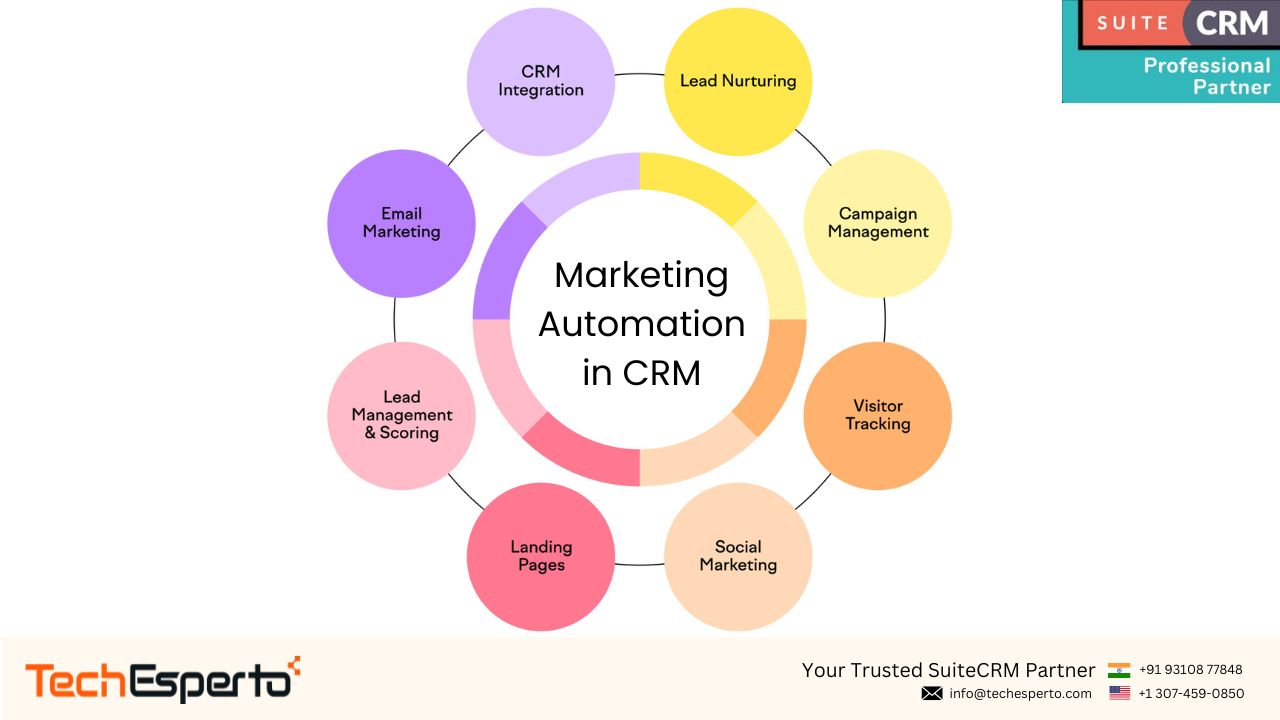Marketing automation in CRM (Customer Relationship Management) integrates advanced tools that streamline marketing tasks like email campaigns, lead generation, and personalized outreach. By automating repetitive tasks, CRM systems with marketing automation can segment customers based on behavior, track engagement, and optimize campaigns to improve conversion rates. This reduces manual effort and enables a data-driven approach, allowing businesses to nurture leads more effectively, build stronger customer relationships, and scale marketing efforts efficiently. Whether through email, social media, or other channels, marketing automation in CRM systems helps boost overall marketing performance, making it a must-have for modern businesses.
Understanding Marketing Automation and CRM
Marketing automation refers to software platforms and technologies designed to automate repetitive marketing tasks. These can include email campaigns, social media posting, ad management, and more. The goal is to increase efficiency and provide a more personalized experience for customers without the need for constant manual intervention.
On the other hand, a Customer Relationship Management (CRM) system is a technology for managing all your company’s relationships and interactions with current and potential customers. It helps businesses stay connected, streamline processes, and improve profitability by organizing customer data in a centralized platform.
When combined, marketing automation and CRM create a powerful synergy that enhances the capabilities of both systems.
The Role of Marketing Automation in CRM
Integrating marketing automation into your CRM system bridges the gap between marketing and sales teams. Here’s how:
- Unified Customer Profiles: Marketing automation feeds valuable customer interaction data into the CRM, enriching customer profiles with behavioral insights.
- Enhanced Lead Management: Automated lead scoring and nurturing ensure that only the most qualified leads are passed to sales, improving conversion rates.
- Personalized Customer Journeys: Automation enables the delivery of tailored content based on customer interactions and preferences recorded in the CRM.
- Improved Analytics: Combining data from both systems provides a comprehensive view of marketing ROI and sales effectiveness.
Benefits of Integrating Marketing Automation with CRM
- Streamlined Operations: Automating repetitive tasks frees up time for marketing and sales teams to focus on strategic initiatives.
- Increased Personalization: Delivering the right message at the right time enhances customer engagement and loyalty.
- Better Alignment Between Teams: Shared data and goals ensure that marketing and sales are working collaboratively towards common objectives.
- Enhanced Data Accuracy: Automation reduces the risk of human error in data entry, leading to more reliable analytics.
- Scalable Processes: As your business grows, automated systems can handle increased workloads without a proportional increase in resources.
Key Features to Leverage
When integrating marketing automation with your CRM, consider utilizing the following features:
- Email Marketing Automation: Schedule and personalize emails based on customer behavior and segmentation.
- Lead Scoring and Nurturing: Automatically qualify leads based on predefined criteria and nurture them through the sales funnel.
- Social Media Management: Automate posting schedules and monitor engagement across platforms.
- Analytics and Reporting: Access real-time data on campaign performance and customer interactions.
- Workflow Automation: Create automated sequences for various customer touchpoints, ensuring consistent communication.
Implementing Marketing Automation in Your CRM
Choosing the Right Tools
Select a CRM platform that either has built-in marketing automation capabilities or can seamlessly integrate with third-party automation tools. Consider factors like ease of use, scalability, and the specific needs of your business.
Integration Best Practices
- Data Synchronization: Ensure that data flows bi-directionally between systems for up-to-date information.
- Segmentation Strategy: Develop a robust segmentation approach to tailor marketing efforts effectively.
- Testing and Optimization: Regularly test automated workflows and adjust based on performance metrics.
Training and Adoption
Invest in training for your teams to maximize the benefits of the integrated system. Encourage collaboration between marketing and sales to foster a unified approach.
Real-World Impact
Companies that have successfully integrated marketing automation with their CRM systems report significant improvements:
- Higher Conversion Rates: More personalized and timely communications lead to increased conversions.
- Improved Customer Retention: Enhanced engagement strategies contribute to stronger customer relationships.
- Increased Revenue: Streamlined processes and better-qualified leads result in higher sales figures.
Future Trends to Watch
As technology evolves, so does the potential of marketing automation in CRM:
- Artificial Intelligence (AI) and Machine Learning: AI-powered tools can offer predictive analytics and more sophisticated personalization.
- Omnichannel Marketing: Integrated platforms will better manage customer interactions across all channels for a cohesive experience.
- Enhanced Data Privacy: With growing concerns over data security, systems will place greater emphasis on compliance and protection.
Conclusion
Integrating marketing automation with your CRM system is no longer a luxury but a necessity in the modern business environment. It not only enhances efficiency and customer engagement but also provides a competitive edge by enabling data-driven strategies. By embracing this integration, businesses can foster stronger customer relationships, streamline operations, and ultimately drive growth.
Ready to transform your customer engagement strategy? Start exploring marketing automation solutions that integrate seamlessly with your CRM and watch your business reach new heights.



